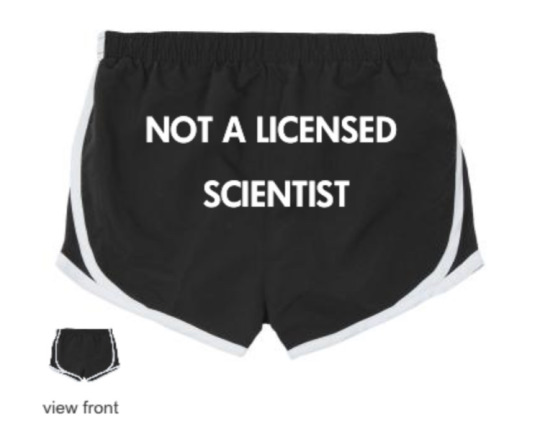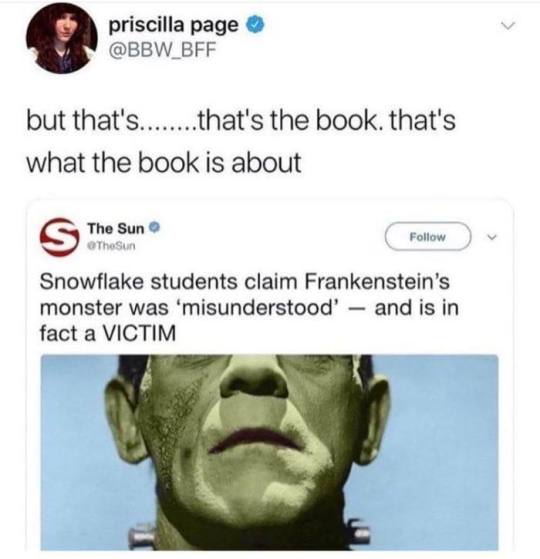And people who write about Mary Shelley and gothic novels
Don't wanna be here? Send us removal request.
Text

— Mary Shelley, from Frankenstein
2K notes
·
View notes
Text

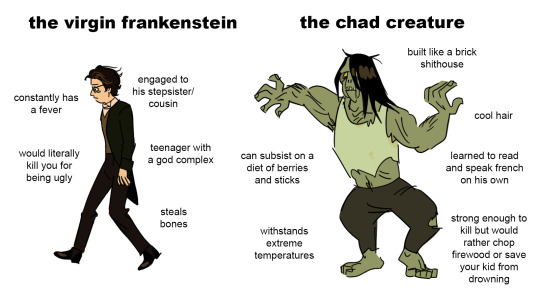

i don't usually post my art online but guess who has a new favorite book
17K notes
·
View notes
Photo


Gothic Literature Recommendations
I read a lot of Gothic literature as part of my PhD research so I thought I’d put together a list of some of my favourite Gothic tales. These are mainly texts that I’ve worked on (which is why most of them are from the late-eighteenth and early-nineteenth centuries) and I’ve tried to provide links to free versions of each text as well as to the print edition I use.
The Castle of Otranto by Horace Walpole (1764) [x] [x]
Sir Bertrand, a Fragment by John Aikin and Anna Laetitia Barbauld (1773) [x]
The Old English Baron by Clara Reeve (1777) [x] [x]
Vathek by William Beckford (1786) [x] [x]
A Sicilian Romance by Ann Radcliffe (1790) [x] [x]
The Romance of the Forest by Ann Radcliffe (1791) [x] [x]
The Castle of Wolfenbach by Eliza Parsons (1793) [x]
The Mysteries of Udolpho by Ann Radcliffe (1794) [x] [x]
The Monk by Matthew Lewis (1796) [x] [x]
The Mysterious Warning by Eliza Parsons (1796) [x]
The Italian by Ann Radcliffe (1797) [x]
The Midnight Bell by Francis Lathom (1798) [x]
Tales of Superstition and Chivalry by Anne Bannerman (1802) [x]
Zofloya; or, the Moor by Charlotte Dacre (c.1806) [x]
Zastrozzi by Percy Bysshe Shelley (1810) [x]
The Giaour by Lord Byron (1813) [x] [x]
The Devil’s Elixir by E.T.A. Hoffmann (1815) [x] [german]
Christabel by Samuel Taylor Coleridge (1816) [x] [x]
Northanger Abbey by Jane Austen (1817) [x] [x]
Frankenstein by Mary Shelley (1818) [x] [x]
Fragment of a Novel by Lord Byron (1819) [x]
The Vampyre by John Polidori (1819) [x] [x]
Melmoth the Wanderer by Charles Maturin (1820) [x] [x]
The Eve of St. Agnes by John Keats (1820) [x] [x]
The Private Memoirs and Confessions of a Justified Sinner by James Hogg (1824) [x] [x]
Wuthering Heights by Emily Brontë (1847) [x] [x]
Childe Roland to the Dark Tower Came by Robert Browning (1855) [x]
Carmilla by Joseph Sheridan Le Fanu (1872) [x] [x]
The Strange Case of Dr Jekyll and Mr Hyde by Robert Louis Stevenson (1886) [x] [x]
The Picture of Dorian Gray by Oscar Wilde (1890) [x] [x]
Dracula by Bram Stoker (1897) [x] [x]
The Turn of the Screw by Henry James (1898) [x] [x]
Ghost Stories of an Antiquary by M. R. James (1904) [x]
*This post does not contain affiliate links*
623 notes
·
View notes
Text
Victor Frankenstein losing his shit and breaking an oath because the idea of potentially creating a mate for his monster and having them go on to reproduce was just too horrifying to him that he didn’t even realize he could just... not add a functioning womb...
6K notes
·
View notes
Text
I don’t like to call Frankenstein’s creation a ‘monster’ because he seems pretty chill, so I just call him Frankenstein’s lil boi
166K notes
·
View notes
Text
What Mary Shelley might have written under happier circumstances—during a less barren period in English literature, with a happier childhood, without the deaths of her children and husband which darkened her life—must, of course, remain a matter of conjecture....A world that considered real dead babies to be equally important in literature as universal plague or the male creation of life in the laboratory might have allowed Shelley to write very differently. Instead of 'my hideous progeny', Frankenstein, as she calls it, we might have had Mary Shelley dealing with the here-and-now—a better novelist perhaps, but then perhaps also a worse mythmaker. The question must remain forever open.
Joanna Russ, To Write Like A Woman
#mary shelley#frankenstein#gothic novels#joanna russ#women writers#women authors#women in literature
73 notes
·
View notes
Quote
There is something at work in my soul, which I do not understand. I am practically industrious—painstaking;—a workman to execute with perseverance and labour;—but besides this, there is a love for the marvellous, a belief in the marvellous, intertwined in all my projects, which hurries me out of the common pathways of men, even to the wild sea and unvisited regions I am about to explore.
Frankenstein, Mary Shelley
5 notes
·
View notes
Quote
Now I am twenty-eight and am in reality more illiterate than many schoolboys of fifteen. It is true that I have thought more, and that my day dreams are more extended and magnificent, but they want (as the painters call it) keeping; and I greatly need a friend who would have sense enough not to despise me as romantic, and affection enough for me to endeavour to regulate my mind.
Frankenstein, Mary Shelley
29 notes
·
View notes
Text
but did victor frankenstein actually have a phd
286K notes
·
View notes
Photo
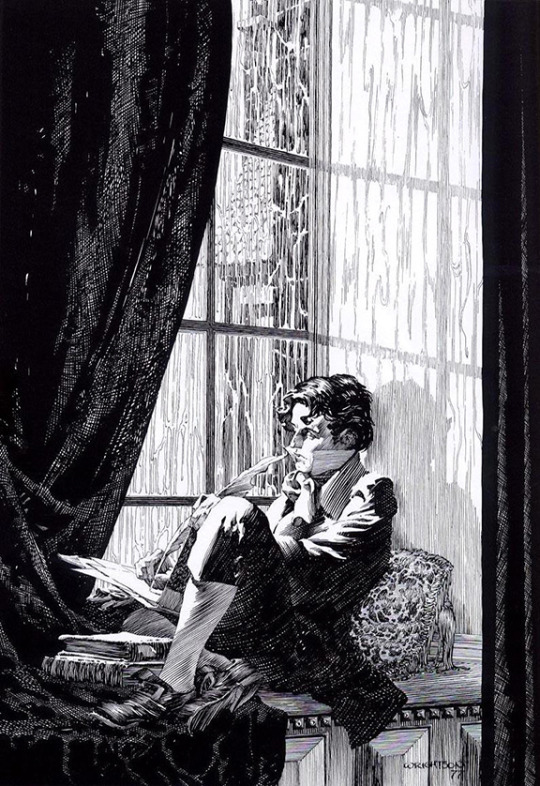

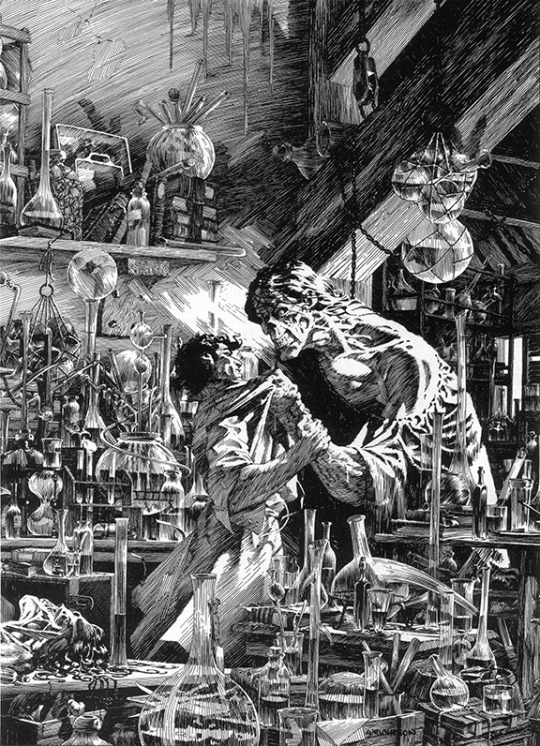
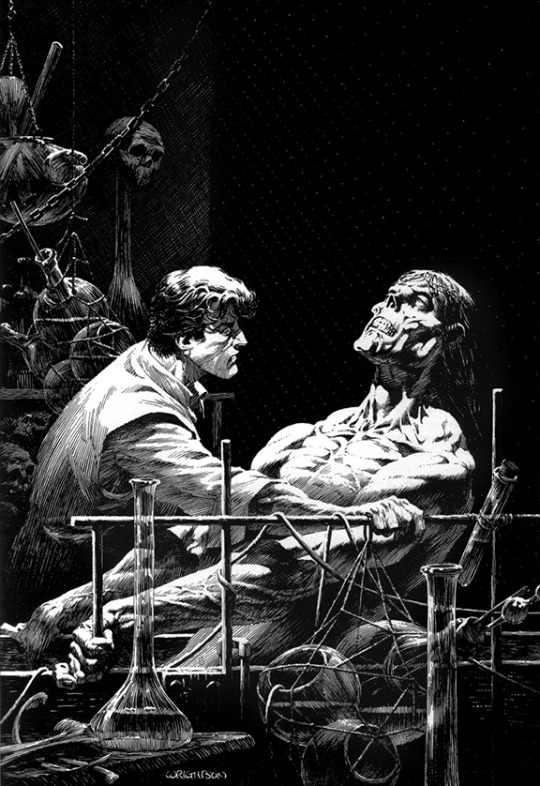
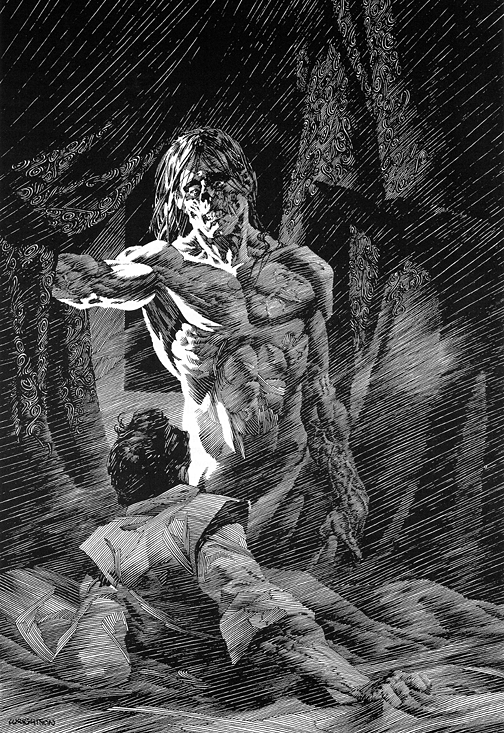
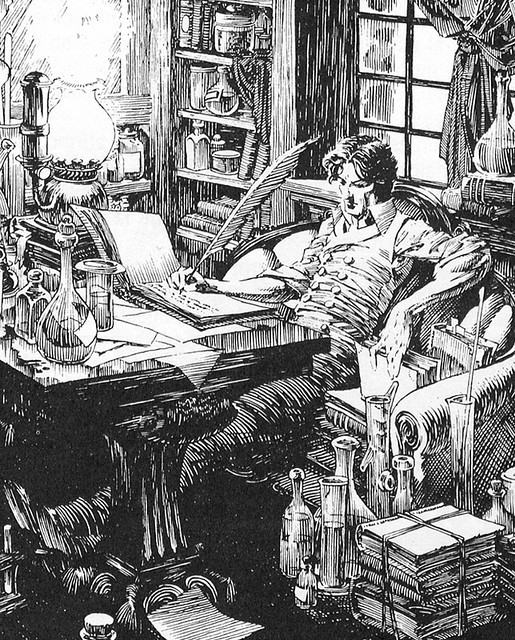
*GROSS SOBBING AT HOW UNBEARABLY BEAUTIFUL THESE ILLUSTRATIONS ARE*
From Bernie Wrightson’s Frankenstein
90K notes
·
View notes
Text
The really hilarious thing about Frankenstein that modern adaptations almost invariably leave out is that the dude wasn’t even a scientist.
Yeah, there’s that post going around about how he wasn’t really a doctor because he never graduated university, but here’s the thing: he wasn’t even studying science.
The text is explicit on this point: Frankenstein was a student of alchemy, not medicine. He thought he was pretty hot stuff because his alchemist cred impressed folks in the middle-of-nowhere town where he grew up, but then he enrolled in a big city university and everybody laughed at him, not because his ideas where too cutting edge, but because they were absurdly archaic.
Here’s these people literally forging new paths in surgery and germ theory and everything that would become modern medicine, and then here’s this punk kid shooting his mouth off about, like, vital humours and shit. How could they not mock him?
That’s where the whole “I’ll show them - I’ll show them all!” bit comes from.
15K notes
·
View notes


